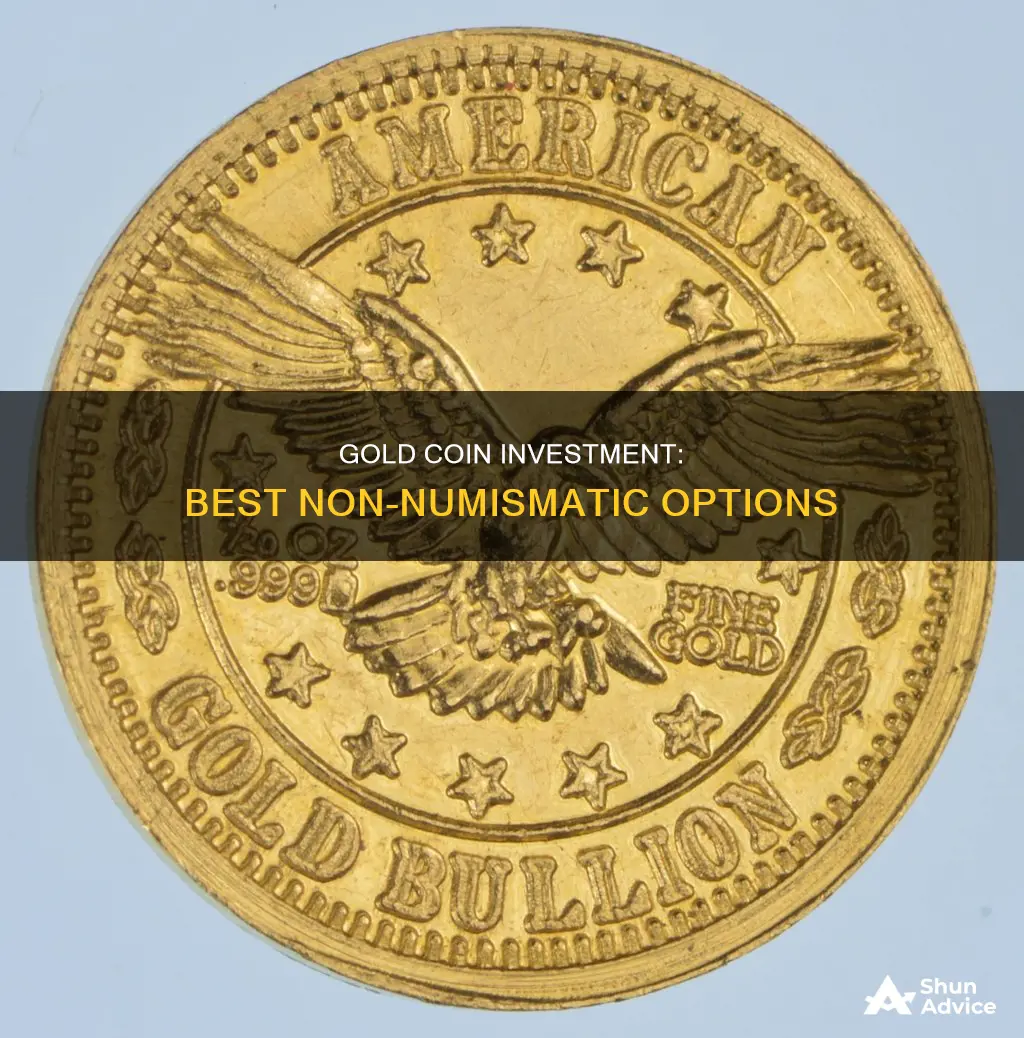
Investing in gold coins can be a fun hobby and a great way to own a piece of history. However, it can also be a risky venture if you are looking to make a profit. Numismatic coins, or collectible coins, are valued based on factors such as age, rarity, and historical significance, which can be highly subjective and difficult to navigate for novice investors. The market for these coins is also less liquid than that of bullion coins, which are valued primarily based on the spot price of gold and are widely recognised and accepted.
If you are considering investing in gold coins, it is important to do your research and understand the risks involved. While numismatic coins can offer the potential for high returns, they also come with a higher risk of losing money due to their subjective valuation and the specialised nature of the market. On the other hand, bullion coins offer a more stable and transparent investment, backed by the intrinsic value of gold.
So, which non-numismatic gold coins are best to invest in? Bullion coins, such as the American Gold Eagle, Canadian Maple Leaf, and Chinese Panda, are recommended for investors seeking a straightforward, liquid investment. These coins are valued primarily based on the spot price of gold and are widely recognised and accepted, making them easier to buy and sell. For those interested in numismatic coins, it is crucial to do extensive research and consult trusted experts to avoid overpaying or falling prey to scams.
| Characteristics | Values |
|---|---|
| Rarity | The rarer the coin, the higher its value. |
| Age | The older the coin, the more valuable it is. |
| Condition | The better the condition, the more desirable the coin is. |
| Historical Significance | Coins with historical significance are more valuable. |
| Demand | Higher demand leads to higher prices. |
| Subjectivity of Value | The value of a numismatic coin is largely subjective and based on individual perceptions of its characteristics. |
| Dealer Expertise | Dealers are usually coin experts, so buying from them puts you at an instant disadvantage. |
| Resale Market | The resale market for numismatic coins is small and specialised, making it challenging to find buyers. |
| Dealer Ploys | Some dealers use deceptive marketing or sales tactics to overstate the value of their coins and charge high premiums. |
| Bullion Coins | Bullion coins are based on the spot price of gold and have a tangible value, offering a more stable investment. |
| Numismatic Premiums | Numismatic premiums are influenced by economic growth and a booming economy, with higher incomes bidding up coin values. |
| Non-Correlation | The bullion and numismatic values of semi-numismatic coins do not always move in lockstep, providing diversification to an investment portfolio. |
| Grading | Grading services provide professional evaluations of a coin's condition, impacting its value. |
What You'll Learn

Premiums on non-numismatic gold coins
When it comes to investing in non-numismatic gold coins, it's essential to understand the concept of premiums. The premium is the amount above the bullion value that a coin sells for. While bullion coins are valued primarily based on the type and weight of the metal, non-numismatic or semi-numismatic coins have additional value due to factors like rarity, condition, historical significance, and demand. Here are some key points about premiums on non-numismatic gold coins:
- Premium Range: Non-numismatic gold coins can have premiums ranging from 10% to around 100% of their bullion value. The premium depends on the specific coin and market conditions.
- Bullion vs. Numismatic Value: Non-numismatic gold coins derive value from both their bullion content and their numismatic or collector's value. The bullion value is based on the spot price of gold, while the numismatic value is influenced by factors like rarity, condition, and demand.
- Independent Movement: The bullion and numismatic values of non-numismatic gold coins don't always move in lockstep. This means that even if the price of gold declines, the numismatic value of the coin may rise, providing a potential hedge against losses.
- Long-Term Perspective: Investing in non-numismatic gold coins is typically a long-term strategy. The value of these coins can fluctuate, and it may take time for the numismatic premium to increase significantly.
- Supply and Demand: The premiums on non-numismatic gold coins are influenced by supply and demand dynamics. Rarity and limited mintages can drive up premiums, especially for coins with historical significance or attractive designs.
- Grading and Condition: The condition and grade of a non-numismatic gold coin can significantly impact its premium. Coins in better condition, with fewer marks or damage, will generally command higher premiums. Third-party grading services can provide an independent assessment of a coin's condition, which is important for establishing its value.
- Dealer Premiums: Be cautious when purchasing non-numismatic gold coins from dealers, as some may charge excessive premiums or use deceptive marketing tactics. It's important to research the coin's value and compare prices from multiple sources to avoid overpaying.
- Diversification: Non-numismatic gold coins can add diversification to an investment portfolio. They offer exposure to gold as a tangible asset while also providing the potential for numismatic value appreciation over time.
The Ultimate Guide to Bitcoin ETF Investing
You may want to see also

The market for non-numismatic gold coins
Bullion coins are produced by a country's national mint and are thus referred to as sovereigns. They are also produced by certain private refiners and dealers. Examples of reputable bullion coin producers include Credit-Suisse, PAMP, Johnson-Matthey, Engelhard, and SilverTowne.
Bullion coins are a good option for those looking to invest in gold as a long-term financial investment and store of value. They are also a good option for those who want to avoid the complexity of the numismatic market, which is driven by intangible factors such as age, rarity, and historical significance.
However, it is important to note that the bullion market is not completely immune to market fluctuations. The price of gold tends to rise during times of economic volatility and fall when the economy is strong and stable. Thus, it is generally not recommended to purchase gold for investment purposes when the price has risen rapidly over a short period.
Additionally, while bullion coins are a more stable investment option, they may not offer the same potential for high returns as numismatic coins, which can appreciate in value by several hundred per cent.
A Beginner's Guide to Bitcoin Investment via eTrade
You may want to see also

Pros and cons of investing in non-numismatic gold coins
Non-numismatic gold coins, or bullion coins, are priced based on their gold content rather than their collectability. They are a good investment option if you are looking to stabilize your portfolio during market declines and safeguard against inflation.
Pros of investing in non-numismatic gold coins:
- Gold tends to increase in value when other investments decline, providing stability for your portfolio.
- Gold is a safeguard against inflation.
- You don't have to pay capital gains tax until you sell.
- Gold is a tangible asset that can be stored in a safe or bank vault, providing a sense of security.
- Gold coins can be purchased from reputable dealers or financial institutions, reducing the risk of fraud.
- Gold coins are easily recognizable and can be used for buying and selling in worst-case financial scenarios, such as massive currency devaluation.
Cons of investing in non-numismatic gold coins:
- There is a risk of theft when investing in tangible assets like gold coins.
- Gold coins do not provide any perks such as dividends or interest payments.
- You may have to wait years for gold to increase in value, and even then, there is no guarantee of a substantial profit.
- Gold coins are more expensive to produce than bars, so you'll pay a higher price for the same amount of gold.
- Storing gold coins securely can be costly, whether you keep them in a home safe or a state-of-the-art storage facility.
- There is a risk of counterfeits, so it's important to only purchase from top mints and dealers.
- Gold coins can fall out of favor with investors, leading to lower resale prices if you need to sell your investment quickly.
The Rise and Fall of Bitcoin Investment Trust
You may want to see also

How to buy non-numismatic gold coins
If you're thinking of buying non-numismatic gold coins, it's important to do your research and understand the market. Here's a guide on how to buy non-numismatic gold coins:
Understand the Difference Between Bullion and Numismatic Coins
Before investing, it's crucial to understand the difference between bullion and numismatic coins. Numismatic coins, also known as collectible or rare coins, are valued for their rarity, historical significance, or other unique characteristics beyond their precious metal content. The price of these coins is subject to external factors like collector demand, auctioning, and timing. On the other hand, bullion coins are valued based on the spot price of gold or silver and are considered a more stable investment.
Consult with a Trusted Dealer or Advisor
When considering purchasing non-numismatic gold coins, it's essential to seek advice from a trusted source. Consult with a reputable coin dealer or investment advisor who has extensive knowledge of the precious metals market. They can guide you in making informed decisions and help you avoid common pitfalls and scams.
Research the Market and Coin Values
Understanding the market dynamics and coin values is crucial before investing. Study historical precious metal prices, use price guides, and refer to coin magazines to gauge the general value of non-numismatic gold coins. Additionally, utilise resources like the Numismatic Guaranty Corporation (NGC) and the Professional Coin Grading Service (PCGS) to gain insights into specific coin values and grades.
Compare Prices and Dealers
Compare prices from multiple dealers to ensure you're getting a fair deal. Be cautious of dealers who advertise incredible deals or use aggressive sales tactics to push numismatic coins. Remember that the intrinsic value of gold remains constant regardless of the form it takes, so focus on finding a reputable dealer offering coins at or near the spot price of gold.
Understand the Risks and Potential Challenges
Investing in any form of gold carries risks. Be aware of the potential challenges, such as the subjective nature of coin values, the illiquidity of the rare coin market, and the difficulty in finding willing buyers or sellers. Understand that investing in non-numismatic gold coins may not provide the same level of protection as investing in bullion coins, which are more widely recognised and accepted.
Take Possession of Your Coins
Once you've made your purchase, ensure you take delivery of your non-numismatic gold coins. Avoid storing your coins in a company's vault, as you may face challenges if the company encounters financial difficulties. Instead, consider storing your coins in a secure location like a bank safety deposit box, where you have direct access and control over your investment.
Strategizing Your Bitcoin Investment: Key Considerations
You may want to see also

How to store non-numismatic gold coins
Non-numismatic gold coins, like any other gold coins, are a very soft metal and can be easily damaged. Therefore, it is important to handle them with care and store them properly. Here are some tips on how to store non-numismatic gold coins:
- Handling: Always handle your coins by the edges and not by the face. This is because dirt and oils from your hands can tarnish the coin's surface. It is also recommended to wash your hands or use hand sanitiser before handling the coins to ensure they are free of damaging oils.
- Surfaces: When handling the coins, lay them on a soft towel or thick cloth to ensure a soft landing in case they are dropped.
- Breathing and Saliva: Avoid breathing on the coin's surface and never use saliva to clean it.
- Handling Frequency: Only handle the coins when absolutely necessary. The best way to avoid damage is to keep them stored away.
- Storage Location: Keep the coins stored in a cool, dry place as excessive heat and moisture can lead to corrosion. Avoid containers made of PVC as they can decompose when reacting to heat and light, releasing hydrochloric acid, which will eat away at the metal in your coins.
- Storage Containers: For lower-valued coins, coin albums and flip books can be used, but they are not completely airtight. For more valuable coins, consider using air-tight containers or a coin slab, which is a hard plastic case usually used for graded coins.
- Storage at Home: If storing your coins at home, keep them in a safe, secure place that is not obvious to potential burglars. Consider using a safe that is flame-retardant to protect your coins in case of a fire.
- Bank Safety Deposit Box: If you are concerned about the safety of your coins at home, consider renting a safety deposit box at your local bank. However, keep in mind that you will not have immediate access to your coins, and choose a box that is not too close to the ground to avoid potential damage from carpet cleaning chemicals.
The Ultimate Guide to Investing in Bitcoins
You may want to see also
Frequently asked questions
Non-numismatic gold coins are gold coins that are not rare or valuable. They are usually mass-produced and their value is primarily driven by their gold content rather than intangible factors such as age, rarity, or historical significance.
Non-numismatic gold coins are a more stable investment compared to numismatic coins. Their value is based on the spot price of gold, which tends to rise during economic volatility and fall when the economy is strong and stable. Additionally, the bullion market for non-numismatic coins is more liquid and has higher demand, making it easier to resell these coins.
Some recommended non-numismatic gold coins include bullion coins and bars from reputable dealers, such as those offered by government mints like the United States Mint. Examples of gold bullion coins include the American Gold Eagle, Canadian Maple Leaf, Chinese Panda, and South African Krugerrand.







